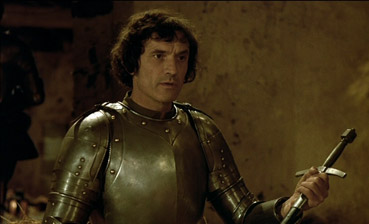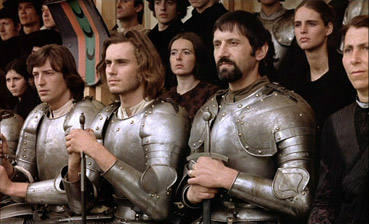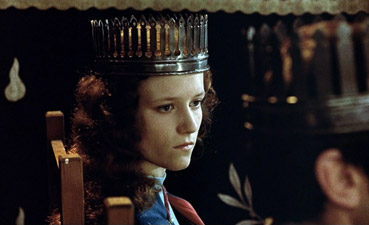|
Robert Bresson added another notch to his minimalist belt with the 1974 Lancelot du Lac [Lancelot of the Lake], an Arthurian tale about as far from any Hollywood realisation of the legend as you can probably imagine. Like Dick Lester's 1976 Robin and Marion, it visits its characters in their post-glory days, men whose time in the sun has passed and whose private lives and status are in decline. But where Lester's Robin Hood retains a youthful enthusiasm that transcends his age, Bresson's Sir Lancelot has clearly left any such positive thoughts on the battlefield.
The film begins two years after a group of specially selected Round Table knights embarked on a quest to find the Holy Grail, with Sir Lancelot returning alone and empty-handed to Camelot. Although the Grail itself alluded him, he was blessed with a vision of this most sacred of treasures and a call to devote himself to God. To that end he meets with Guinevere, the wife of his king and with whom he has been having a secret affair, and asks that she free him from the bond of love that he once pledged to her, something she is unwilling to do. Rumours of their affair, meanwhile, are causing divisions amongst Lancelot's fellow knights. Sir Gawain and his brothers remain loyal to him, but a growing camp of disapproval is forming behind Mordred, a knight Gawain regards as cowardly and who rejects Lancelot's offer to put past differences behind them.

Bresson's Camelot is not one of pomp and grandeur but of the everyday and the functional. The famed round table is a straightforward construct that sits in an ordinary-looking white-walled room not much larger than the table itself. And you can forget the grand hallways and elaborate tapestries of previous cinematic visions – Bresson's castle is one of small rooms, narrow corridors and with quarters enough only for the King and his bride, the Knights living in tents in the castle grounds.
Despite the increasing conflicts, emotions do not run high here. Conversations between the knights are always low key, while Lancelot's meetings with Guinevere have a distance about them emphasised by their repeated refusal to address each other face to face. Even Gawain's dislike for Mordred is kept in check, his suppressed contempt surfacing only as quiet words of warning or a half-drawn sword.
All of which will no doubt make Lancelot du Lac sound like a dreary and lifeless affair and for some that's exactly how it will play. Driven by often inexpressive conversation and with the action restricted to the brief early snippets of medieval combat and an unusually shot and edited central jousting competition, the film appears to go out of its way to avoid delivering the traditional pleasures that the story is famed for. And if you're new or unsympathetic to Bresson's minimalist realism then there are a fair few other barriers to climb, from the almost Python-esque opening beheading (you can blame Monty Python and the Holy Grail for that one – the hilarious sequence in which Graham Chapman's Arthur systematically and bloodily severs the limbs of John Cleese's cocksure Black Knight plays suspiciously like direct parody of this sequence*) to the repeated use of the same horse whinny and crow caw and armour that clanks like a rack of metal kitchen implements being shaken by a sound effects man every time a knight makes even the smallest move.

And yet there's something about Bresson's approach, in his stripping the legend of its glamour, in the pall of sadness and impending doom that hangs over the castle and its inhabitants and in his viewing of familiar actions from unfamiliar viewpoints (the repeated focussing on legs of knights and horses in sequences that would normally filmed in long or mid-shot), that exerts an unexpectedly hold. The film's aesthetic is at its most striking in the above-mentioned jousting tournament that Lancelot anonymously attends to reconfirm his status by besting his fellow knights in competition, a scene structured almost as a repeating loop of cut-aways – a raised flag, a galloping horse, the watching crowd, a toppled adversary and the handing over of a fresh lance. This could be read as a low-budget get-around for a difficult-to-stage scene (although some of the stunt tumbles are spectacular enough to dispel this), but is as good an example as you'll find here of Bresson's stated "only the necessary" methodology.
As has been rightly stated elsewhere, Lancelot du Lac is definitely not one for the mainstream audience and is likely to have its share of detractors, even amongst those sympathetic to a more experimental approach, whose viewpoint I do understand but do not necessarily share. Yes, I did smile at that opening beheading (curse you, Python boys) and more than once quietly giggled at the clanking armour and a horse whinny that sounds a little too much like a famous one in Young Frankenstein, but I was still strangely compelled by the drama and by the sheer balls of Bresson's cinematic risk-taking. I'd thus suggest that it's worth the possibility of being pissed off by the film for the chance that you may find yourself similarly enthralled.
By the way, if you're in any way balking at the concept of a French film version of the Arthurian legend then be aware that the writings that gave birth to it are as much French as they are British, and that Sir Lancelot, the most famous Round Table knight of them all but who was never a part of the early fables, was actually the creation of twelfth century French poet Chrétien de Troyes.
An anamorphic 1.66:1 transfer from a print that appears to have undergone some restoration, the minor debris of which is still visible as flickering on areas of single light colour and some of the darker scenes. Otherwise the picture holds up well, particularly its sharpness and contrast, although shadow detail when the light drops is not great and film grain is sometimes very visible. Sequences set outside in sunlight look excellent.

Save for Philippe Sarde's excellent main theme and some diegetic fanfares at the joust, the soundtrack is music free and populated only by dialogue and often isolated sound effects, all of which are clear enough. A slight background fluff is detectable, but is not intrusive.
Surprisingly for Artificial Eye, the only extra here is a Robert Bresson filmography, the same one you'll find on the other recent Bresson releases, A Man Escaped and The Devil, Probably.
A Bresson film that really divides its audience, though I found it easy to understand both viewpoints and still appreciate the film's qualities. A tough one to recommend as it's almost guaranteed to annoy as many as it will intrigue, and the balance is not tipped by Artificial Eye's DVD, which boasts a most reasonable transfer but nothing in the way of extra features. For Bresson devotees it's an easy enough choice, but others might want to try before they buy.
- May 1974: Lancelot du Lac has world premiere at Cannes (the festival ran from 9-24 May);
- 24 May 1974: Monty Python and the Holy Grail definitely already in production (that's the date on a continuity sheet reproduced in the tie-in book);
- August 1974: Monty Python and the Holy Grail has first test screening;
- 26 September 1974: Lancelot du Lac opens theatrically in France;
- April 1975: Monty Python and the Holy Grail goes on UK release;
- September 1975: Lancelot du Lac goes on UK release.
My sincere thanks to Michael Brooke for this detailed timeline and the heads-up regarding my original conviction that the Pythons were directly parodying Bresson.
|